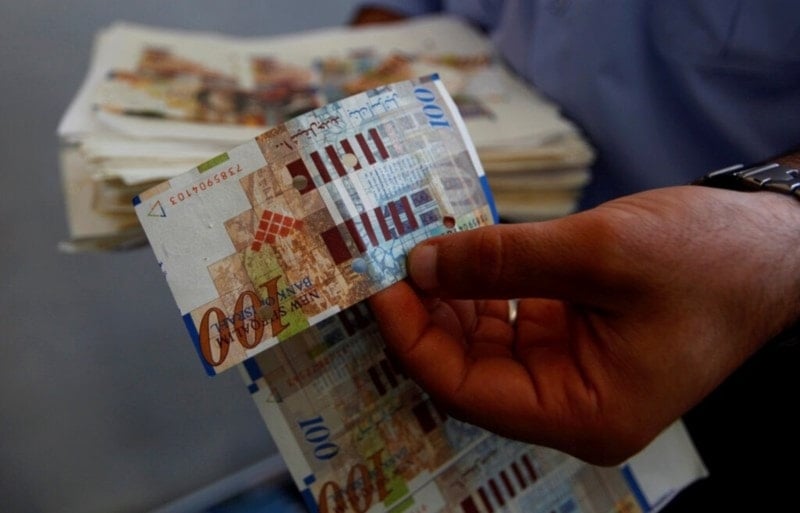'Israel' facing 'economic disaster', unpayable future debt: Israeli MK
Israeli MK Mickey Levy says that the "government budget has become a plundering budget," criticizing Netanyahu's actions as "ridiculous and frightening."
-

An Israeli policeman displays counterfeit Israeli 100 Shekel bills, July 7, 2013. (AP)
The chairman of the Israeli government's oversight committee and member of the Knesset, Mickey Levy, warned that the occupation entity is "facing an economic catastrophe" under the government of Israeli Prime Minister Benjamin Netanyahu.
Talking to the Israeli Maariv newspaper, the senior official said that the "government budget has become a plundering budget," criticizing Netanyahu's actions as "ridiculous and frightening."
Read more: Unemployment rate 20% higher in northern 'Israel': Report
Unpayable debt
Providing more details, Levy explained that the Israeli government has inserted "illogical" issues in the 2023 budget, such as allocating over 600 million shekels to bolster "Jewish identity and culture," questioning whether "identity awareness" required such spending.
Furthermore, he added that there are "unnecessary ministries in the government," noting that in the past, there were fewer than 30 ministers, but now there are 38 ministries, at least 10 of which are non-essential.
"At a time when every shekel is supposed to go towards war efforts, in this government, no one seems to care," added the Knesset member.
In this context, Levy predicted that the 2024 budget would be even worse, with "future generations" continuing to bear the burden of debt that they will not be able to escape.
Read more: Israeli economy at risk as 'Israel' continues its war on Gaza
He emphasized that "Israel is heading toward an economic disaster," pointing out that the gross domestic product GDP will decline, the budget deficit will soar, and the external debt, previously at a trillion shekels, will increase.
Bibi must go
In light of these developments, Levy conveyed that every step taken by Netanyahu is aimed at "preserving his personal interests; he only thinks about himself," and he noted that there is "complete dissatisfaction with his behavior."
"Netanyahu has become a danger to Israel," he told the newspaper, adding that "he must step down, without elections, not just because he is unhelpful but because he also harms Israel."
The Knesset Member also believed that there should be elections after "the biggest failure in Israel's history...Bibi cannot continue to be the prime minister."
Read more: 'Israel's' budget deficit surges amid the aggression on Gaza
No answers
The current direction of Israeli Prime Minister Benjamin Netanyahu in the ongoing war on Gaza is "to continue the fighting," Israeli newspaper Haaretz reported on Monday.
As the war on Gaza entered the 12th week, this approach was marred by a decline in popular support, which initially grew following the operation. However, Netanyahu has now become a source of doubt and concern among Israelis, the report said, adding that "Israel is approaching a dangerous reality of stagnation."
According to a survey conducted by the Israeli "Institute for Democracy," 69% of Israelis support the idea of holding new elections immediately after the cessation of the aggression on Gaza. Furthermore, the data indicates that 64% of respondents believe that "Israel" lacks a well-structured post-war plan.
Read more: Resistance still fighting in Jabalia despite IOF claims of taking city
The first issue to face Netanyahu, according to the newspaper, is that he will find it difficult to explain the war objectives to Israelis if clear achievements are not realized on the ground.
The second problem is that the gradual transition in the war - from the "high-intensity" to "low-intensity" phase - requires significant material and logistical field preparations, and there are no indications that the government and the military are seriously preparing for such a phase in the coming weeks, as only marginal ground measures are being taken.
Thirdly, his government's approach toward the angry families of captives held by the Resistance in Gaza is becoming to represent a serious issue for his ruling, and further increasing the social and political rift in the occupation entity, which had already started before the war over his judicial reforms.

 4 Min Read
4 Min Read








